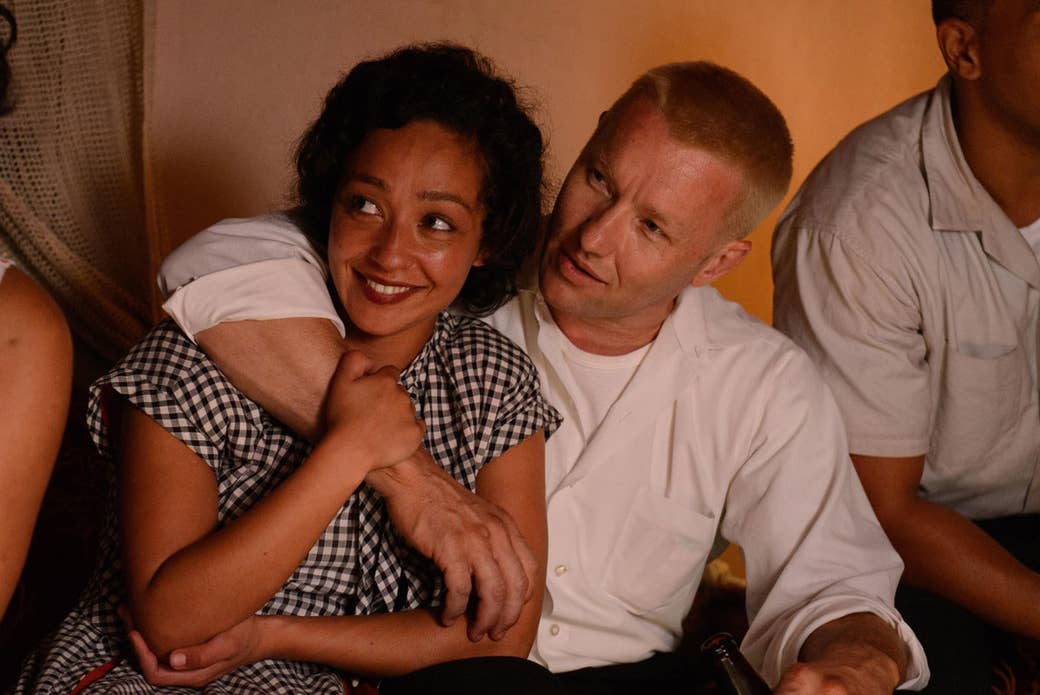
Ruth Negga's going to get a Best Actress nomination for this. It's a thought that crossed my mind every time Loving settled in for a closeup of Negga's strikingly expressive face, capturing its quiet happiness, or fear, or growing resolve.
Awards potential is an incredibly annoying rubric by which we judge artistic worth, but it's unavoidable when something is as rife with overt Oscar-y signals as Loving. The film is based on the true and historically significant story of Mildred and Richard Loving, the married interracial Virginia couple whose legal case Loving v. Virginia led to the Supreme Court striking down anti-miscegenation laws in 1967. It's written and directed by Jeff Nichols, the gifted director of Take Shelter, Mud, and most recently, Midnight Special, here working in a style that's more conventional than his previous work. Loving's cast is stacked with a Moneyball-style collection of undervalued talent, with Negga playing Mildred; Joel Edgerton as Richard; and Marton Csokas, Nick Kroll, and Nichols' muse Michael Shannon showing up in side roles.

Loving is awards-bait, but the best possible version of awards-bait. It doesn't trumpet its importance obnoxiously, and it's packed with performances of quiet power, with Negga as the breakout. The Ethiopian-Irish actor is poised for a huge year, with a part in the upcoming video-game adaptation Warcraft, the role of Tulip O'Hare in AMC's upcoming comic book adaptation Preacher, and this fall-pegged film, which wears its quality like a leather-bound book. With Edgerton portraying Richard as a minds-his-own-business, keeps-his-head-down type, it's Mildred who makes changes and who demands change; thus, it's Negga who gleams as the emotion core of the film.
In the years over which the movie spans — from when the couple wed, to when the parents of three become subjects of a Life magazine story — Mildred goes from allowing Richard to steer to gently taking the lead over their relationship herself, refusing to be cast into exile because her home state forbids her marriage. She insists that, in working with the ACLU on their case, they can help others besides themselves.
But Loving is a film about a marriage, not a lawsuit, first and foremost. In the beginning, its restraint looks like a potential weakness — Mildred and Richard aren't dramatic people. They want only to live their lives together, even when their loved ones chastise them for what they see as troublemaking. By the end, that ordinariness feels, movingly, like the point. As Chief Justice Earl Warren wrote in his opinion on the case, "Marriage is one of the 'basic civil rights of man.'"

Adam Driver and Iranian actor Golshifteh Farahani enact an even sweeter portrait of married life in Paterson. Jim Jarmusch's portrait of a week in the life of a New Jersey bus driver/poet and his big-dreaming wife is almost unbearably blissful, the way each day starts with an overhead shot of the two asleep in bed, Driver's character (named Paterson, just like the city in which the couple lives) reflexively waking first and taking a moment to soak in the warmth and the presence of his sleeping partner. The relationship between Paterson and Laura (Farahani) is romantic, but it's the kind of romance that surfaces in the small domestic pleasures of a daily routine, the packed lunches and conversations about how the day went, in addition to those hazy morning moments.
There's another kind of romance at work in the film, the romance of the blue collar poet. Jarmusch admires Paterson's life — waking, cereal, walking to work, driving the bus, composing lines, heading home, walking the dog he can't stand, and stopping by the local bar for a drink — with the way another filmmaker might lovingly shoot a training montage in a movie about a warrior. Paterson isn't preparing for anything, and despite his wife's encouragement, takes no action to get his work out in the world. But there's an austerity to his days and to his processes that Jarmusch sells very effectively. And so does Driver, with his off-kilter sincerity. His name and his character's job match in a way that is its own sort of poetry.

